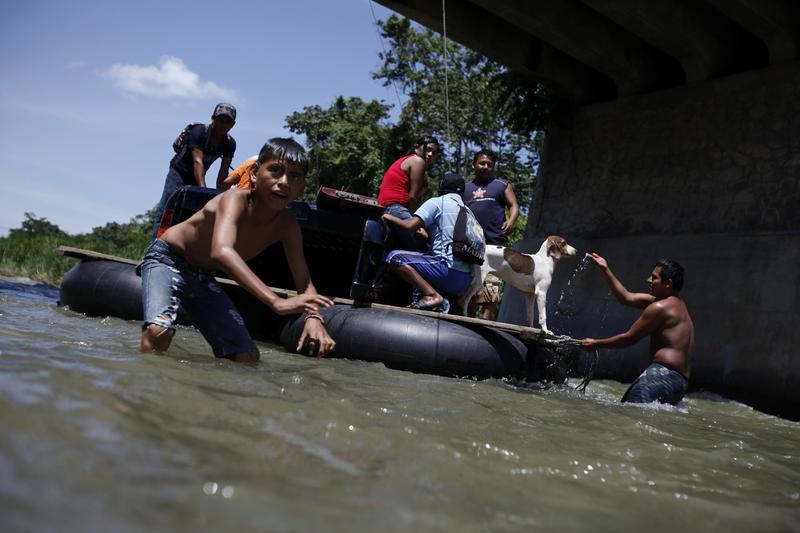BROOKE GLADSTONE: This is On the Media. I’m Brooke Gladstone.
BOB GARFIELD: And I'm Bob Garfield. The tape of sobbing children obtained and released by ProPublica this week didn't only reverberate in the US. Carlos Dada is an editor at El Faro, a digital newspaper based in El Salvador and he says the recording and all the other reports about separated parents and children are changing the way Central Americans are seeing their relationship with us.
CARLOS DADA: I have to tell you that Honduras, Guatemala and El Salvador are some of the countries where the United States is a very popular country but now we hear and see our children crying, this has caused an unprecedented wave of anger against the United States.
BOB GARFIELD: Well, you’re describing public outrage and, and grief and pain but then there's the governments of Honduras, El Salvador and Guatemala who have been markedly less demonstrative in their reactions. Why?
CARLOS DADA: Because, of course, the United States is such a huge power and its influence is so big that no one wants to be in a fight with the United States. Take, for example, Honduras. Its president, Juan Orlando Hernández, was reelected November last year through what every single international organization considered a fraud but he's there because his fraud was approved by the United States and he is held in that position by the United States. Take Guatemala. Its president's party has been accused of corruption, it’s being investigated by a United Nations commission and he’s asking the United States to stop fueling money to this United Nations commission. El Salvador is a bit more independent but we still depend on some foreign aid that the United States sends. So that explains a bit why popular outrage has not found an equivalent among Central American governments.
BOB GARFIELD: The spokesman for the president of Guatemala had told the press that Guatemala respects the United States’ application of law in its immigration policy and it created an uproar.
CARLOS DADA: Yes, indeed. The answer from the whole Guatemalan society was anger because it’s Guatemalan children there. So the president was obliged to fire him the next day and said they were fixing a new position of the Guatemalan government, taking back those statements.
BOB GARFIELD: And what about the media? Many newspapers and TV stations, radio stations are heavily influenced, let's say, by their governments. How vocal have they been in deploring Trump’s conduct?
CARLOS DADA: Oh, very vocal. I mean, this is just too much, Bob. I mean, since Trump came into office, if you remember, he announced his candidacy speaking ugly, very ugly things against Mexicans and Central Americans, and we see this basically as a racist measure. He said just two days ago that all these immigrants are criminals bound to “infest” the United States.
And let me just add, if you allow me, just one more thing. These parents with their children have already taken a very dangerous path to get to the US. They don’t do this because they like to, to cause some suffering in their children, they do this because they are desperate. They are running away from risks and dangers posed in these countries. So that’s why they are there.
When they arrive there, the children are already traumatized. These are some of the most violent countries on Earth. Let’s take gangs, for example, in El Salvador. A lot of urban communities are controlled by gangs. That means that a gang leader decides whether you can go to school or not. A gang leader decides how much you have to pay as an extortion for them to allow you to leave. A gang leader decides whether he likes your daughter or not, which means whether he’s gonna take her by force or not. A gang leader basically decides who leaves and who doesn’t.
BOB GARFIELD: This is a classic root cause situation. You can try to deter all you want but unless these societies are somehow made less threatening to citizens, illegal migration will continue. What, if anything, is being done? What can be done?
CARLOS DADA: Well, the United States should stop supporting corruption in Central America, which the United States has been doing for years, which allows criminal mafias to be empowered in some of our countries. By the way, this is not the United States’ sole responsibility. Our politicians have not been doing their homework, that’s for sure. The United States should be helping to think about more long-term solutions and not politically-convenient immediate solutions that bring nowhere.
BOB GARFIELD: Carlos, thank you so much.
CARLOS DADA: Bob, thank you, thank you for giving me the chance to [LAUGHS] -- I hope I, I was able to control my anger.
BOB GARFIELD: You did splendidly, under the circumstances. Carlos Dada is editor of El Faro, a digital newspaper based in El Salvador.


